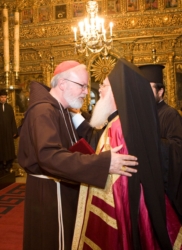An Eritrean refugee lies contorted on the ground. Balanced on his belly, his hands clutch his feet behind his back, bending his legs back almost double.
Paulus is demonstrating a torture technique known colloquially as "the helicopter".
It is one [that] he knows well. It was in this excruciating position, he claims, that soldiers left him tied up for 136 hours, in an attempt to force him to recant his faith.
"They kept asking me to sign a document," he recalls, "and agree to not participate in church activities or express my faith in any form. I was told [that] I would be untied and released the minute [that] I agreed to their requests."
Paulus is an evangelical Christian from Eritrea, one of an increasing number fleeing the tiny Red Sea state because of religious persecution.
Home these days is Shimelba refugee camp in northern Ethiopia, close to the disputed border with Eritrea. Here, in the Ebenezer Evangelical Church on camp, Paulus is free to worship in a way that is unthinkable back in his homeland.
Jailed
During the past five years, a brutal campaign has been waged in Eritrea against Christian minorities, focusing mainly on the evangelical and Pentecostal movements.
Weddings, baptisms, church services, and prayer meetings have been raided by security forces. Guests or congregation members have rounded up and detained en masse.
According to Compass Direct, a non-governmental organisation reporting on the persecution of Christians around the world, it is estimated that almost 2,000 people are being held in jails across Eritrea because of their religious beliefs.
The crackdown on Eritrea's minority churches followed a government announcement in May 2002 that only its four oldest faiths - Orthodox, Catholic, Lutheran, and Islam - would receive official sanction.
The rest were invited to register and declare their sources of funding. To date, none has been registered.
Beatings
Evangelical Christians who have been arrested face severe pressure to recant their faith. Some prisoners have been held in metal shipping containers.
Accounts of torture, lack of food, and terrible conditions are commonplace.
Samuel (not his real name) is 24 and university-educated. Along with 19 others, he was arrested in 2005 when he attended the wedding of a friend.
For the next 12 months, he was imprisoned and forced to do backbreaking manual labour. He was also regularly beaten.
On one occasion, Samuel said, he was suspended by his arms from a tree for three days in the form of a crucifixion. He was also constantly pressured to leave his faith.
"They asked me if I would like to leave it. They asked every night for four months," he said. Some of his friends did recant after endless beatings.
Samuel, as well as Paulus, were repeatedly asked about their links with the US. Evangelical and Pentecostal churches are widely perceived by the Eritrean authorities as having originated in the States, even though many fund themselves.
The US is threatening to declare Eritrea a rogue state for its alleged support of terrorists, and the mood of President Isaias Afwerki and his Marxist-oriented government is now openly anti-American.
Yet even official, long-established faiths have not escaped government interference.
Patriarch Abune Antonios, the head of the Eritrean Orthodox Church - a faith followed by more than 40% of Eritrea's population - has been under house arrest for almost two years.
'No repression'
Four months ago, the 80-year-old, who suffers from diabetes, was moved to an undisclosed location. Since then, there has been little information about what happened to him.
No official reason has been given for his disappearance. His supporters, however, claim that he was arrested after he objected to the jailing of church leaders from the Medhane Alem, a spiritual renewal movement within the Orthodox church.
In May [of] this year, a new patriarch was installed with the support of some Eritrean bishops. But the new patriarch has not been accepted by the Coptic Church in Alexandria, Egypt.
Abba Seraphim is the head of the British Orthodox Church, which is launching an online petition to protest about the plight of the patriarch.
He told me [Tanya Datta] the patriarch was put under house arrest after he refused to do the government's bidding. "The only thing [that] we've heard is that he's being kept in a darkened room. He managed to get a message to someone complaining about this," Mr Seraphim said.
But, according to Girma Asmeron, the Eritrean ambassador to Belgium, the disappearance of Patriarch Antonios is far from sinister. The patriarch, he claims, has retired to an isolated monastery and is very much "alive, kicking and praying".
Mr Asmeron denies that there is any repression of religious freedom in Eritrea. He says [that] persecution claims have been made up. And allegations of torture, he says, are stories invented by refugees "simply as a certificate" to enable them to get political asylum.
Refugees certainly continue to pour out of Eritrea. In two years, the number of asylum applications by Eritreans to the West has increased by 57%. The UNHCR recently described the exodus as "one of the world's most-protracted refugee situations".
My last contact with Eritrea's persecuted Christians came in an e-mail sent to me last week.
"The situation in Eritrea is getting worse and worse after the president stated that the US is funding the Pentecostal church in Eritrea," it said.
"Many Christians are suffering in military concentrations [camps] and police stations... Pray for the Christians in Eritrea, and pray for the prisoners and their families."
BBC World Service's Assignment programme is broadcast on Thursday, 27 September at 0800 GMT, 1100 GMT and 1900 GMT.






